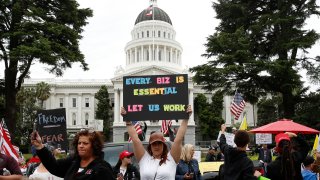
California will have a budget shortfall of $54.3 billion because of the economic devastation wrought by the coronavirus, Gov. Gavin Newsom’s administration announced Thursday, a deficit so large it will swallow the state's reserves and put teacher jobs and health coverage at risk during a pandemic.
The state has been under a mandatory stay-at-home order since mid-March, forcing nonessential businesses to close and prompting more than 4 million Californians to file for unemployment benefits. After recording record low unemployment of 3.9% at the start of the year, the Newsom administration now predicts a jobless rate of 18% for the nation's most populous state — 46% higher than the height of the Great Recession a decade ago.
Newsom asked the Trump administration for help, saying that although the state has the fifth largest economy in the world the “revenue shortfalls are bigger than even the state of California." The state is already in line to receive more than $26 billion in federal aid because of the coronavirus, according to an analysis by the nonpartisan Legislative Analyst’s Office. But Newsom was clear the state needs more.
“We cannot do it alone,” he said.
Get top local stories in Southern California delivered to you every morning. Sign up for NBC LA's News Headlines newsletter.
It’s not clear what state programs will be cut or by how much. Newsom will reveal his new spending plan next week. But the revenue shortfall means the minimum amount of spending required for public schools and community colleges will fall by $18.3 billion.
State funding accounts for 80% of most school district budgets, which are mostly spent on teacher and staff salaries, said Troy Flint, spokesman for the California Association of School Boards. He said the shortfall will “have a devastating impact on school staffing levels."
Phil Ting, chairman of the budget committee in the state Assembly, said he doesn't think the state can cut enough spending to fill the budget hole and “may have to look at some additional revenue.” That could mean new taxes, including one on vaping lawmakers are already considering. But any new taxes or fees will be difficult to pass at a time when so many people are out of work.
U.S. & World
News from around the country and around the globe
“It’s devastating because at a time when people need government the most, which is any recession, is also the time when we have limited ability to help,” Ting said.
The virus-induced business closures, unemployed workers and cratering of the restaurant, tourism and entertainment industries have resulted in a staggering loss of tax revenue for California. The Newsom administration projects personal income will fall by close to 9% for the state's nearly 40 million residents while permits for new housing construction — a key measure of the economy's health — will drop more than 21%.
California lawmakers have been saving money for the next economic downturn to try and avoid a repeat of cuts to state services during the Great Recession a decade ago. Since then, the state has had an unprecedented run of economic growth, adding more than 3.4 million new jobs.
That led to increased state spending and huge budget surpluses in recent years, pushing the state's “rainy day fund” to more than $16 billion. But the projected budget shortfall announced Thursday is nearly three-and-a half times that number. dispelling any notion of a quick recovery once the state's coronavirus restrictions are lifted.
“I do think that we are going to all, as a society, regret the degree to which we have allowed government to grow over the last 10 years," said Republican Assemblyman Jay Obernolte, vice chairman of the Assembly Budget Committee. “Certainly if government was smaller and spending was lower we would have an easier time dealing with a budget shortfall like the one that we have.”
The Newsom administration estimates state general fund revenues will decline by $41.2 billion compared with the $222.2 billion spending proposal Newsom revealed in January. Another $6 billion in anticipated emergency spending on the coronavirus for things like protective gear, hotel rooms for the homeless and cash payments for low-income adults living in the country illegally pushes the projected deficit past $54 billion.
Plus, California must pay for an extra $7.1 billion for increased enrollment in social safety net programs, including Medicaid, the joint state and federal health insurance program for the poor and disabled. Advocates worried Thursday the deficit could mean cuts for other social service programs, including subsidies to help middle and lower income earners pay their monthly health insurance premiums.
"This state budget shortfall threatens cataclysmic cuts to health and other vital services at exactly the time during a pandemic when we need them the most,” said Anthony Wright, executive director of Health Access California, a statewide health care consumer advocacy group.
But some legislative leaders have vowed to avoid those cuts.
“We are going to make tough decisions, but we are not going to exacerbate the problem by gutting programs families are relying on,” said state Sen. Holly Mitchell, chair of the Senate Budget and Fiscal Review Committee.



